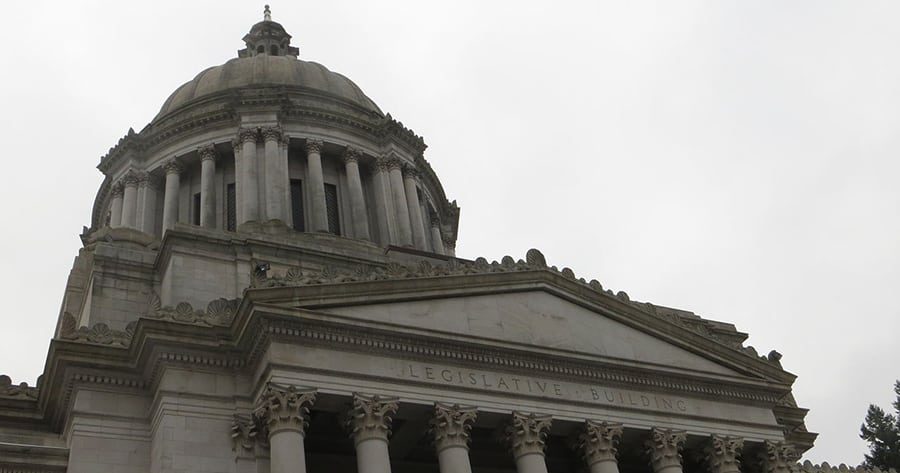
Home » Business community sighs with relief as Legislature wraps for 2022
Business community sighs with relief as Legislature wraps for 2022

March 11, 2022
The Tri-City business community is breathing easier as the 2022 Legislature concluded its work without passing bills some feared would add complexity and cost to operating in Washington.
The regular session ended March 10 in a flurry of activity, including an agreement on a $64.1 billion supplemental budget.
But it’s what didn’t happen that stands out.
Lawmakers didn’t repair the unpopular payroll tax to support long-term care, but they kicked implementation off to 2023. An unpopular unemployment insurance rate hike was avoided too.
Local leaders were relieved when an effort to bring back ergonomics regulations – repealed by voters in 2003 – failed. The proposal did make it to a second reading in the Senate and is expected to return in the future.
But the reprieve at a time of economic uncertainty was welcome.
“Thank heavens to Betsy,” said Stephanie Barnard, government and regulations director for the Tri-City Regional Chamber of Commerce.
Lawmakers also dropped a bill that would have enabled private citizens to sue employers on the state’s behalf for potential violations of state laws pertaining to wages, safety, discrimination and more. The “qui tam” bill was nicknamed the “bounty hunter bill” by opponents.
Local leaders cheered when lawmakers scrapped a 6 cents-a-gallon tax to help fund Move Ahead WA, the $17 billion transportation package. The proposal irked officials in Oregon and Alaska who threatened to retaliate.
“The good news for business is the original version was going to start a trade war with neighbors,” said Jason Mercier, the Kennewick-based policy director for the Washington Policy Center, a nonprofit think tank.
Instead, the transportation package will draw from the state public works account and the general fund. Border communities such as the Tri-Cities would have been in the crosshairs of trade disputes with neighboring Oregon.
The package is good for Washington infrastructure, but Mercier and Barnard both lament that it doesn’t include many projects in Eastern Washington or the Tri-Cities.
The Democrat-led initiative squeezed out Republican districts, both said. But they’re cheered that it includes money for multimodal improvements that will ease access to ports – a win for the Tri-Cities – and $3 billion for preservation and maintenance of highways and other infrastructure.
Barnard said business and government leaders from the region testified during transportation package hearings, asking to have a voice in discussions, only to see even modest requests left out.
“We voted on our six top priorities, spoke with one voice. It wasn’t loud enough,” she said.
Lawmakers didn’t fix the WA Cares Fund, the long-term care insurance program. Employers were supposed to begin collecting payroll taxes from all workers this year, but Gov. Jay Inslee signed a temporary delay to iron out questions of portability and equity.
The issues weren’t resolved, but tax collections are now delayed until 2023.
Barnard said WA Cares affects employees and not businesses, but it generated significant questions from employers who weren’t sure if they should collect the tax or not.
Mercier was particularly pleased to see the Legislature drop House Bill 1076, the so-called bounty hunter bill.
The proposed law would have allowed third parties to sue on behalf of state agencies if they believed employers were violating the state’s employee protection rules pertaining to wages, discrimination and more.
Mercier said it could have led to open season on employers and reduced employers’ willingness to hire independent contractors.
Barnard trumpeted several other wins, including tax preferences for data centers and two bills to facilitate apprenticeships.
Mercier and Barnard both lamented that lawmakers didn’t offer significant tax breaks, despite being flush with higher-than-expected revenue.
“There is no broad-based tax relief in the business community which is surprising considering how much revenue there is. If not now, they will never do it,” said Mercier, who has written extensively on the subject.
Homebuilders eyeing single-family home zones were disappointed when the 2022 Legislature dropped Gov. Jay Inslee’s “Middle Housing” proposal to allow duplexes and townhomes in these zones.
The proposal, supported by Washington Realtors, was part of the governor’s larger strategy to tackle homelessness and affordability by reducing the state’s housing deficit, estimated at 225,000 units.
Inslee said he planned to bring it back in 2023 during a Feb. 22 visit to the Tri-Cities.
Local News
KEYWORDS march 2022




